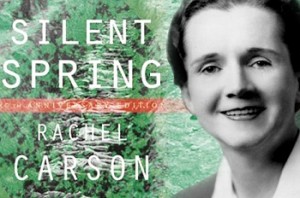
More evidence that low-calorie sweeteners are bad for your health
Studies show that artificial sweeteners can raise the risk of hypertension, metabolic syndrome, type 2 diabetes and heart disease, including stroke.

It’s 50 years since Rachel Carson predicted a Silent Spring. Now we face a new and more insidious chemical threat from neonicotinoid pesticides, as our friends at the Soil Association spell out in this special contribution to NYR Natural News.
The Soil Association has always believed that using chemicals sprays to kill insects or weeds, or control diseases in crops is a risky and ultimately ineffective way of farming.
In 1946, the first edition of the Soil Association journal, Mother Earth, questioned the use of the pesticide DDT in agriculture:
“By the wholesale use of powerful insecticides of which far too little is yet known, we may well be upsetting the whole balance of Nature. We are like schoolboys rat-hunting in a munition dump with a flame-thrower.”
Then, in 1962, the courageous American scientist, Rachel Carson, published her book Silent Spring, which for the first time, challenged the use of chemical sprays in farming, which had grown rapidly during and after the Second World War.
In those days, the toxic chemicals most commonly used in farming were organochlorines such as DDT, a persistent organic pollutant which accumulates in food chains.
Anger in the face of the scientific facts
Scientists working for the chemical industry and governments, supported by farming leaders, claimed all was well. The few brave scientists who contradicted them were vilified.
As the populations of birds like Golden Eagles, Peregrines and Sparrow Hawks crashed in the UK, the evidence that something had gone terribly wrong was overwhelming. Still chemical companies and the government said there was no definite proof, and refused to ban DDT.
In the end, as we now know as we now know, scientists working for the RSPB and other conservation groups were proved right, DDT was not killing birds of prey directly, but causing thinning of egg shells which killed chicks, and led to population crashes, and it was banned.
New era, same old story
Unbelievable as it seems, exactly 50 years later we face an almost identical catastrophe.
A whole new class of chemicals which work by entering every part of a plant, including pollen, where they remain toxic to insects throughout the plant’s life, have been introduced. The most notorious are the insecticides neonicotinoids, in the UK mainly used as seed dressings for hugely widespread crops like oil seed rape, which we have seen spread across our countryside, as well as other crops like maize.
What scientists are now discovering is that very, very low doses of neonicotinoids, well below what European governments consider a ‘safe’ level of toxic chemical, can disrupt bee behaviour in ways that are contributing to the collapse in numbers of honeybees, bumble bees and other pollinating insects.
A large body of scientific evidence is now building, for example two studies published in the journal Science earlier this year reveal the multiple ways these pesticides can impact pollinators.
The first study showed that the production of queens in of a common species a bumble bees dropped by a massive 85% after the insects were exposed to the neonicotinoid imidacloprid. In the second study, researchers studied honey bees exposed to the neonicotinoid thiamethoxam. The study found that it severely affected the bees homing ability to the extent that they were two to three times more likely to die while away from their nests.
Organic helps us move forward
The latest science, in an uncanny replaying of the DDT story, has found that these systemic neonicotinoid insecticides cause the thinning of the shells of Partridge eggs, thus preventing them from breeding successfully.
The UK government refuses to take action without more evidence, just as they did in the face of the appalling damage done by DDT fifty years ago.
It is a tragedy that 50 years after Rachel Carson’s brave fight, we are still facing these threats.
But now organic farming and food is growing rapidly throughout the world, with over 10% growth in organic food sales in America and most European countries, despite the recession. We represent an alternative which works and which is on the increase.

Please subscribe me to your newsletter mailing list. I have read the
privacy statement